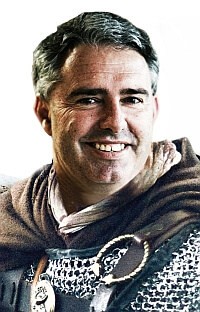The water in the great dam looked like black glass in the moonlight as the sentry stood on the parapet above, gazing toward the flickering fires of Waiparus, a hamlet to the east. A centurion loomed up out of the darkness and joined him on the walkway above the dam’s huge timber wall.
“Anything moving out there?” he murmured to his companion. The other sentry shook his head.
“I’m more worried about things moving here,” he replied.
“What do you mean?” asked the other man.
“This place gives me the creeps. It doesn’t feel safe. I swear I felt it sway a few minutes ago,” said the first sentry.
“Ah, it’s just your imagination,” said his colleague. “This dam is built like a brick bathhouse.”
The first sentry was silent. He had felt uncomfortable ever since he was assigned to guard duty on the dam. He knew many of the peasants blamed it for turning the region’s rivers and streams into mosquito-breeding ribbons of green slime. But it wasn’t pike-wielding peasants he feared. He had heard an augury had tried to get a sign of approval for the dam from the Roman god of water and earthquakes, the mighty Neptune, by the traditional Roman method of feeding sacred chickens to see if they spilled any food in their haste to eat. If they did, said the augury, it was a good omen. Unfortunately two of the chickens had choked to death, one had been snatched by a hawk and three had been flattened by a chariot in the resulting panic.
The sentry shivered. Neptune’s violent rage was legendary. One shake of his trident could trigger an earthquake that would send a massive wall of water from the dam down the valley, wiping out Waiparus. Neptune had once destroyed the hilltop settlement of Napierion, far to the north, after its citizens had captured some of his beloved dolphins and made them perform tricks.
A loud creak from one of the timber beams holding back the huge body of water made the sentry jump so sharply that he let go of his spear. He watched it bounce off the dam’s massive wall as it cartwheeled into the valley floor far below,
“That’ll cost you a week’s wages,” smirked his companion.
It was market day in the small village of Havers. The villagers wandered among stalls selling olive oil, stuffed artichokes, pesto and bread. They parted as a tall figure came striding along the dusty path. Bright sunlight reflected off the copper breastplate and helmet of Lawrencus Yulus, provincial governor of Heretaungus.
Lawrencus ignored the peasants as he glanced at the goods on display.
He had almost walked past one stall when he suddenly caught sight of a basket of eels. They were milky white
and to his astonishment, had small growths on their undersides and heads like balloons at each end.
“What in Great Jupiter’s name are these unearthly creatures?” he asked the cringing merchant.
“A very rare form of eel your worship,” stammered the man. “They come from the Pukus River behind these hills. I caught them myself this morning.”
Lawrencus gritted his teeth and glared at the man.
“Are you mad?” he roared. “Nobody in their right mind would eat anything from that cesspool.”
The merchant swallowed nervously.
“I admit they’re not big sellers,” he said, “but they’re the only things that can survive in the green slime, unless you fancy a nice juicy toad. They go well with pickled olives and a rough red from that black barn over there.”
Lawrencus grimaced. He recalled his boyhood years when the Pukus River was a favourite swimming spot and a good source of trout. He’d almost forgotten what trout looked like. The water courses which once traced their route to the Bay of Hawks like great arteries were now just dusty depressions on the landscape, replaced by a grid of canals fed from the great dam in the hills to the west.
That cursed dam had changed everything.
He walked a few more yards and watched as a plump merchant argued with a customer over the cost of a stone jug of water. The customer was complaining that the price had risen 60 percent in the past week.
“Don’t blame me mate,” growled the merchant. “The dam owners want every drop for the bloody cows.”
“What about a jug of milk then?” said the angry customer. “After all, we’ve got more cows than people these days in Heretaungus.”
“You’re joking,” snorted the seller. “That’s twice the price of water. Gold’s cheaper.”
Lawrencus turned away. He had crushed all opponents on the plain of Heretuscany, but now the dam had become the real ruler of the province, transforming its landscape and controlling its destiny. He had even sacrificed a few bulls to Neptune in the forlorn hope he would shake things up, preferably the dam’s foundations, but the dam remained intact.
Feeling depressed, he stopped at the black barn to buy a jug of wine. Perhaps a quiet dinner would improve his mood. But the food stalls were now empty, their customers heading home. Clutching his jug, he was walking back toward his chariot when a voice called out to him. It was the fish seller.
“Cheer up Lawrencus,” the man said cheerily. “I’ve kept this nice fat eel just for you. Look, it’s even got a smile on both of its faces.”

